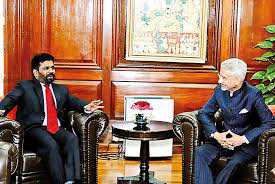During JVP’s insurrection, the first of the party’s five policies was “Indian Expansionism”. JVP launched Armed Campaign against the India – Sri Lanka Accord
— Visuvanathan Rudrakumaran
NEW YORK, UNITED STATES, February 8, 2024 /EINPresswire.com/ —
The recent visit of the leaders of the Janatha Vimukithi Peramuna (JVP) in the island of Sri Lanka to India at the invitation of the Indian government has raised eyebrows in many quarters. On February 5th, the first day of the visit, the delegation comprised of JVP leader Anura Kumara Dissanayake, Secretary Nihal Abeysinghe, senior legislator Vijitha Herath and executive committee member Professor Anil Jayantha met with India’s External Affairs Minister S Jaishankar and National Security Advisor Ajith Doval, said Visuvanathan Rudrakumaran, the Prime Minister of the Transnational Government of Tamil Eelam (TGTE).
“During the JVP’s 1970 attacks and 1971 insurrection, the first of the party’s five policies was “Indian expansionism”. The JVP also declared the Tamils as a tool of “Indian expansionism.” In 1987, the JVP viewed the Indo-Sri Lanka Accord as an expression of “Indian expansionism” and launched an armed campaign against the Accord”
“More recently, in 2006, the JVP challenged the merger of the Northern and Eastern provinces of the island of Sri Lanka, which merged pursuant to the Indo-Sri Lanka Accord. Article 1.4 of the Indo-Sri Lanka Accord states, ” …the Northern and Eastern Provinces have been areas of historical habitation of Sri Lankan Tamil speaking peoples who have at all times hither lived together in the territory with other groups”. Article 2.1 of the Accord facilitates the merger.”
“The JVP’s legal challenge resulted in the two provinces’ demerger, which contributed significantly to the collapse of the peace process between the Liberation Tigers of Tamil Eelam (LTTE) and the Sri Lankan government. Also, it was the JVP that brought an ultimately successful and disastrous legal challenge against the Post-Tsunami Operational Mechanism (P-TOMS), which was designed to address the urgent needs of the Tamil victims of the tsunami.”
“Historically, India’s meetings with Sri Lankan presidents, prime ministers and officials have been seen through the lens of diplomatic necessity and protocols. India’s recent act of officially meeting a political party, on the other hand, is unapologetic puppeteering.”
“India’s invitation to the JVP seems to be the continuation of the nation’s failed old policy and “strategic” thinking that regime change contributes to India’s interest. When former President Mahinda Rajapaksa tilted towards China, India and Western powers welcomed the coalition of “Good Governance”. However, the Hambantota 99-year lease agreement was not revisited by the “Good Governance” coalition, leaving Sri Lanka’s bend toward China intact”, said Rudrakumaran.
In fact, when current President Ranil Wickremesinghe was Prime Minister of the “Good Governance” coalition, he made a pilgrimage to China in 2017 to attend the Belt and Road Forum, which was boycotted by India. When President Wickremesinghe assumed his current office of the president, he allowed the Chinese ship Yuan Wang 5 to dock in Sri Lanka despite objections from India and the US. Now it seems that India is once again thinking, “Out with the old and in with the new, ” with that “new” being a Sri Lankan government headed by the JVP; or taking a softer approach toward the same end and using the JVP to put pressure on the current government.
“The fact of the matter is that the Sinhala polity has historically been anti-India. In 1971, during the Indo-Pakistani War, Sri Lanka allowed Pakistani airplanes to use Colombo Airport. In 1987, in an anti-Indian move, “Bombay Onion” and “Mysore Dhal” were renamed “Big Onion” and “Red Dhal”. They say that the enemy’s enemy is a friend. Today, Sri Lanka is becoming a vessel state of China.” continued Rudrakumaran.
“It is hard to fathom that India, a rising economic and military power that stands up to world superpowers with moral courage, as demonstrated by its role in the Ukraine War, employs appeasement to the tiny bankrupt Sri Lanka to keep it in its sphere of influence. This cannot be the “Indian Way” articulated and promoted by Minister Jaishankar. It seems to be that India lacks strategic clarity with respect to Sri Lanka.”
“We the Tamils, hope that the Indian foreign policy with respect to Sri Lanka should be based on values and interest. Unless India changes it’s policy on the island of Sri Lanka, the whole island of Sri Lanka will become another Maldives.” concludes Rudrakumaran.
* ABOUT THE TRANSNATIONAL GOVERNMENT OF TAMIL EELAM (TGTE):
The Transnational Government of Tamil Eelam (TGTE) is a democratically elected Government of over a million strong Tamils (from the island of Sri Lanka) living in several countries around the world.
TGTE was formed after the mass killing of Tamils by the Sri Lankan Government in 2009.
TGTE thrice held internationally supervised elections among Tamils around the world to elect 132 Members of Parliament. It has two chambers of Parliament: The House of Representatives and the Senate and also a Cabinet.
TGTE is leading a campaign to realize the political aspirations of Tamils through peaceful, democratic, and diplomatic means and its Constitution mandates that it should realize its political objectives only through peaceful means. It’s based on the principles of nationhood, homeland and self-determination.
TGTE seeks that the international community hold the perpetrators of war crimes, crimes against humanity, and genocide against the Tamil people to account. TGTE calls for a referendum to decide the political future of Tamils.
The Prime Minister of TGTE is Mr. Visuvanathan Rudrakumaran, a New York based lawyer.
Email: [email protected]
Twitter: @TGTE_PMO
Web: www.tgte-us.org
Visuvanathan Rudrakumaran
Transnational Government of Tamil Eelam (TGTE)
+1 614-202-3377
[email protected]
Visit us on social media:
Facebook
Twitter
Instagram
![]()
Article originally published on www.einpresswire.com as Appeasing Sri Lanka’s Sinhala Leaders Is Not in India’s Long-term Interest: TGTE





